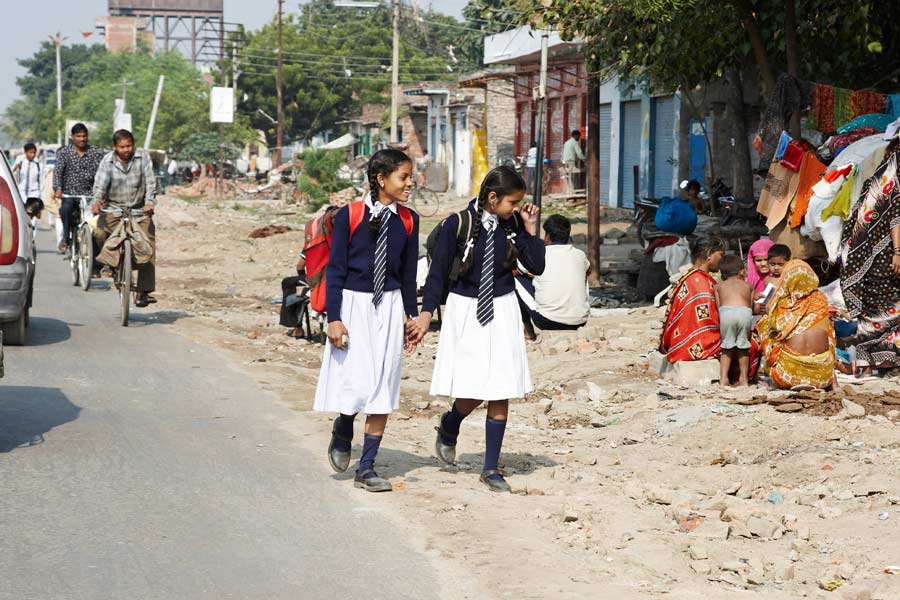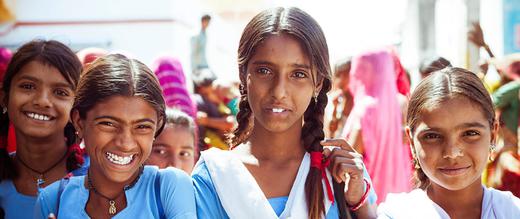The views expressed in our content reflect individual perspectives and do not represent the authoritative views of the Baha'i Faith.
…it is incumbent upon the girls of this glorious era to be fully versed in the various branches of knowledge, in sciences and the arts and all the wonders of this pre-eminent time, that they may then educate their children and train them from their earliest days in the ways of perfection. – Abdu’l-Baha, from a Persian tablet.
Our plane lands at the terminal in the pitch-black dark. We are on the last flight out of Delhi, scheduled to touch down at midnight in Madhya Pradesh, India’s largest central state. There are five of us, three women, two children, all from Los Angeles; all bleary eyed and underslept, dragging wheeled suitcases full of computer equipment and Benadryl, Luna Bars, toilet paper, a drugstore of prescription pharmaceuticals, far too many changes of clothes.
We are here as representatives of the Mona Foundation: a humanitarian organization which seeks out flourishing, grass-roots educational initiatives for women and girls in some of the world’s most poverty-stricken regions and offers these programs support for long-term success.
This visit will give us a window into the daily workings of the Baha’i-inspired Barli Development Institute for Rural Women (www.barli.org) in the city of Indore, which transforms its graduates from tribal girls with few prospects beyond a life of abject scarcity, to self-sufficient farmers and small business proprietors over the course of just one pivotal year.
The term Barli—a common name for females of the Bhilala Tribes in the region—also refers to the central pillar supporting the roof of a traditional tribal home, highlighting the belief that women, in spite of the social injustices they suffer in reality, remain the central pillars of society. The Barli Institute conducts residential training programs for these rural village and tribal women denied access to education or forced to drop out of school:
These women are truly the central pillars. They are making the soul of India literate.
– Dr. Janak Palta, Founder – Barli Development Institute for Rural Women.
My travel companions are Sima Mobini, one of the original members of Mona’s Board; Dr. Karin Harp, a dermatologist; her nine year old son, Quin; my eight year old son, Walter; and me, an author and creative writing teacher, assigned to write it all down.
As the only three females traveling without a male escort on the crowded flight, we received plenty of double-takes from the other passengers, but it wasn’t solely due to our gender or our foreign-ness. Without heels, Karin is just over six feet, and I am close to that, with a tattooed arm and the front of my hair dyed bright red. The two of us literally tower over everyone, looking, I’m sure, like a side show just escaped from the circus.
The armed guards inside the Madhya Pradesh terminal seem to think so anyway. Clearly flustered by everything they think we might represent, they snatch our bags off the luggage carousel and hustle us out to the sidewalk as quickly as possible, watching our every movement with deep concern.
“Don’t worry about us,” Sima reassures them in Hindi, “we are on our way,” but they watch us from the inside of the sliding doors with horrified faces, worried that we might change our minds and decide to come back in.
Fortunately, that will not be necessary, as out of the suffocating heat and cloud of swarming mosquitoes, comes Tahera Jadhav, the current director of the Barli Institute and her family, waiting to greet us. Tahera is incredibly beautiful, with a long black braid and delicate ankle bracelets that tinkle softly as she moves. Her husband, Yogesh, in pressed shirt and tie, stands beside her. And peeking out from behind the skirt of her flowing green sari is Jadhu, their three-year-old son.
“Welcome,” she says, holding out a giant bouquet of tropical flowers. “We are so glad you have come.”
“Thank you, thank you,” we tell her, both grateful and relieved in equal parts, and as she takes each of our hands in both of hers and squeezes gently, my eyes fill with tears. To visit India has been a life-long dream, but to be an eye witness to the work of the Barli Institute; to meet its staff and trainees in person is a privilege I had not ever imagined.

Founded by Dr. Janak Palta in 1986, the Barli Instiitute, inspired by the Baha’i teachings, has uplifted the lives of thousands of tribal girls and women in central India, who face some of the worst human rights abuses on record and who make up the majority of the country’s poor.
Dr. Palta herself has written that the most difficult thing for people outside India to understand is that there can be no singular profile of Indian women that is correct because there are just too many differences; of background, of class and caste, of geography. And there are so many examples of well-known independent Indian women in every field of public life who do not represent the overall condition of the majority in the country. Profiles of Indian women worldwide seldom focus on the women I am about to meet in the next two days.
Since its inception, Barli has grown, sometimes quickly and sometimes more slowly, from a three-day candle- and incense-making workshop in a wooden market stall downtown into one of the most successful and innovative educational programs in the country, serving a large student body of female trainees and graduates that spans the subcontinent, from Tamil Nadu to Bhutan.
Next: Listening to the Prayers of the Nightingales

















Comments
Sign in or create an account
Continue with Facebookor